Changing the foods you eat without looking at the root cause of your hypothyroidism can make things worse for you. When you look up what to eat for hypothyroidism, the most common advice you’ll find are things like:
- Iodine Rich Foods
- Selenium Rich Foods
- Zinc Rich Foods
- Fruits and Vegetables
- Whole-Grains
When you have websites like Healthline, Mayo Clinic or the British Thyroid foundation saying this, it’s easy to see why so many people fall into this trap… but let me ask you:
Are Iodine Rich Foods Good for Thyroid?
The idea that you need iodine for a healthy thyroid comes from the 1930’s when it was believed that an iodine deficiency was causing goiters or thyroid nodules. Most people with hypothyroidism are not growing thyroid nodules, but struggle with other issues like low energy, weight, gas, bloating, constipation, hair loss, bad lab numbers (TSH, thyroid globulin, TPO, etc.)
Taking supplements that contain high amounts of iodine, selenium, zinc, and others could lead to more imbalances making some of these issues worse. That’s why you’ll see people taking thyroid supplements end up feeling terrible and experience nausea, heart palpitations, and other side effects because supplements are created assuming you need iodine or other specific nutrients to improve thyroid function.
People who don’t understand their root cause will follow mainstream advice like seeking out iodine rich foods and supplements that don’t work to fix the real problems they want to fix like:
- How to lose weight with hypothyroidism
- How to beat thyroid fatigue
- Foods to eat for low T3
- Foods to eat for TSH levels
- Hashimoto’s Diet
It’s important to know what your root cause is because what worked for one person may not work for you. There are people who struggle to lose weight with hypothyroidism, and others who struggle to gain weight with hypothyroidism. This is why there’s so much confusion online around what to eat for hypothyroidism.
One person may say they did keto and felt great, while another will feel drained and put on extra weight.
So, before we go into what to eat, we have to talk about the root cause of thyroid fatigue and weight.
Do you struggle with gas, bloating or constipation?
… because if you do, then that’s a sign that you have digestive issues that need to be addressed before you put together a thyroid diet plan that assumes you can digest food. If you can’t digest food, you can’t transfer food energy into energy your body can use even if you eat the right foods.
At Hypothyroidism Success Story, we don’t make the assumption that you can digest all food. Digesting food is a must for anyone who wants to get more energy and stay lean & toned.
If you don’t address digestive issues first, then you will fall for other common advice around hypothyroidism diets like:
- Cut out sugar
- Cut out dairy
- Cut out gluten
- Eat organic
- Go paleo
- Go keto
- Go vegan
- Go carnivore
- Do Whole30
- etc.
… but if you’ve tried any of this, you will find that these diets don’t work long term. They may help in some cases, but not always.
What works for you will be unique to you and here’s what you need to know to design a diet that works for you.
Why You Feel Fatigued and Can’t Lose Weight with Hypothyroidism
Did you know that weight gain and low energy are due to a toxic gut environment?
Imagine cooking a meal and then realizing you don’t have any clean dishes to serve up your meal… you look over at your kitchen sink and see a pile of dirty dishes with food still stuck from the previous day…
You wouldn’t take a dirty dish and serve up your freshly cooked meal on top of that dirty dish would you?
I hope your answer is “no”…
… but if your gut is toxic, then that’s exactly what you are doing…
If your gut is toxic, it means that it’s dirty… it means there is likely food left undigested from the previous day (or days in many cases)…
Suppose you are doing everything you are being told to do by health professionals… you are going on their nutrition program with the right foods to eat for hypothyroidism, cutting out bad foods and taking a handful of supplements… can you see why it doesn’t matter how healthy you eat if the food is going into a toxic environment in your gut?
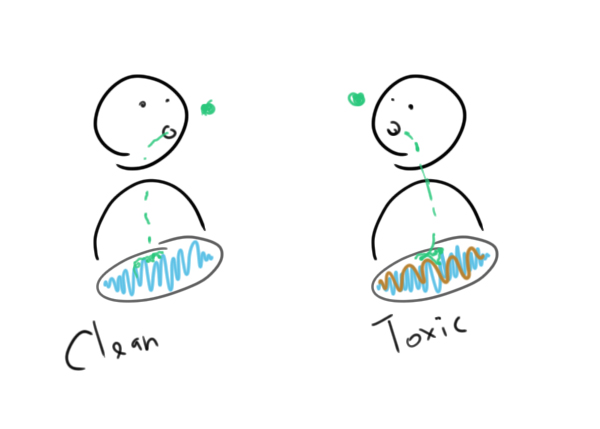
A toxic environment means you have weak probiotics and are growing bad bacteria.
Probiotics take food energy and convert it into energy that the body can use. The byproducts of probiotics digesting food are things like vitamins, hormones and energy. Probiotics thrive in a clean environment.
The byproduct of bad bacteria is gas and toxic waste. That toxic waste drains your energy. That toxic waste is harmful to your body… it’s what makes your lab numbers get out of range. The body will stuff toxic waste into fat cells to protect itself which creates a more toxic environment in your body. Bad bacteria thrive in a toxic environment.
If the environment in your gut isn’t addressed, then no food will work for hypothyroidism. It’s not the food that’s keeping you feeling low energy and gaining weight. The best way to beat thyroid fatigue and lose weight is by changing the environment in your gut. We cover this in more detail in our free 5-Day Energy Challenge.
Once you improve that environment, you can start looking at upgrading the foods you eat that will help with hypothyroidism.
Are Fruits and Vegetables Really Good for Hypothyroidism?
Our food today is not the same as it was a few decades ago.
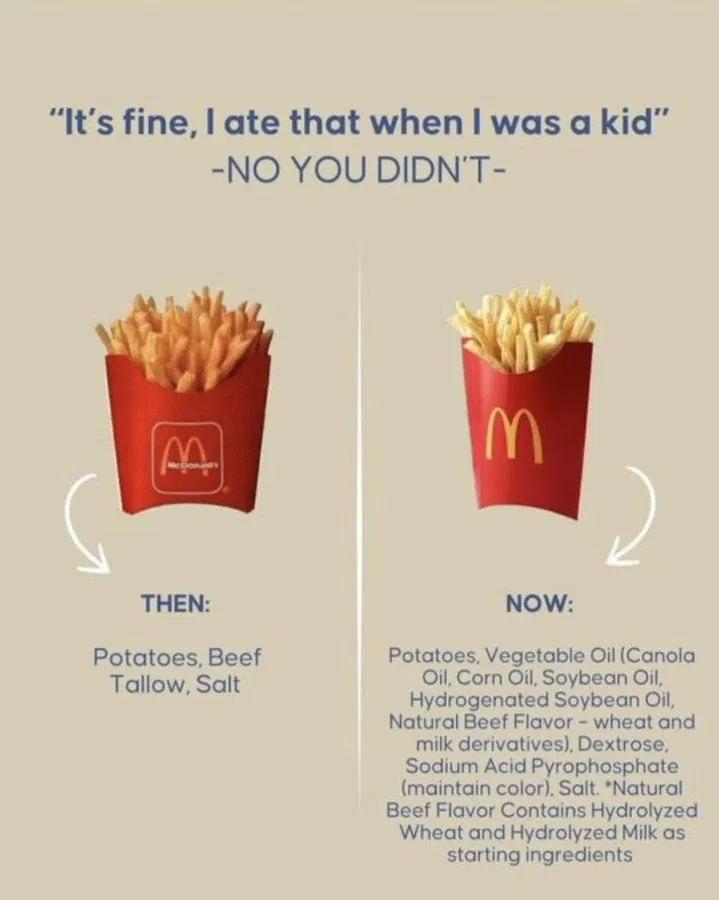
We are so used to hearing about foods that are healthy like fruits and vegetables… but fruits and vegetables are not the same as they once were. If you understand this one concept, then you will be able to find the foods that will help you produce thyroid hormones.
The easiest way to explain what we stand for at Hypothyroidism Success Story is this rule: the best food to improve thyroid hormone production is food that is fertile and/or makes you fertile.
I like this way of describing it, because you can take any diet like keto, paleo, vegan, etc., and you’ll find that these diets don’t work if you eat infertile food. Take the vegan diet for example. Fruits and vegetables are considered to be healthy, but are they really?
If you eat a seedless watermelon, you are eating infertile food. Hormone production is all about being fertile. You can’t help your body be fertile if you eat infertile food. That means that doing a vegan diet eating infertile food will fail long term. On the other hand, if you were to eat a seeded watermelon (or other fertile seeded fruit), then you would be helping your body be fertile (produce hormones.)
So it’s not about the type of diet you’re on, and it’s not about finding the secret fruit or veggie to eat. It’s about eating food that helps you be fertile. Seeds are just one way to know if the food is fertile or if it will make you fertile. When it comes to other foods like vegetables or meats that don’t come with seeds, then what you want to look for the most is minerals.
Many people make the mistake of thinking that “organic” food has minerals. That used to be the case, but not anymore. The definition and standards for “organic” have changed and it no longer includes this criteria. I hesitate to use terms like regenerative farming, or biodynamic farming because those terms can also change so rather than give you a label to look for, I want to share with you what is it about food that’s good for thyroid and what to look for.
So, if the fruits and vegetables you are sourcing out are fertile, highly mineralized, then YES!! they will help you get more energy…
Since most foods today are not fertile or highly mineralized, we have to find ways to mineralize our body. We walk you through this in our free 5-Day Energy Challenge.
… but there’s a caveat.
Not all hypothyroidism cases are created equal. Some people struggle to build muscle while others can’t fit into their jeans by the afternoon. If your blood sugar levels spike easily, then you may need to avoid sugar and focus more on healthy fats. This doesn’t mean you’ll be cutting out sugar.
Cutting out sugar can help regulate blood sugar levels initially, but you need carbohydrates for hormone production, so we don’t recommend cutting out food groups entirely.
Best Thyroid Diet Plan
Diets don’t work. Eating real food does. The best thyroid diet plan is not really a diet as much as it is learning about what makes real food “real”?
Unlike many “health gurus”, we’re not against whole-grains. However, we believe there is a big difference between heirloom grains like einkorn VS the modern wheat grain varieties that have plagued our food system. What’s the difference?
Einkorn wheat – the original, non-hybridized grain – has only 14 chromosomes.
Modern day wheat – hybridized or cross-bred – has over 48 chromosomes.
Modern day wheat is simply not the same, but companies make so much more out of them that they defend it tooth and nail and even promoting it by saying that you need to consume mostly whole-grains. If they were talking about heirloom grains, that would be one thing, but since heirloom grains are hard to find, people who follow this advice end up buying modern day wheat products.
That being said, like fruits, whole-grains can spike your blood sugar levels and that’s what signals your body to store fat, which is what most people want to avoid.
What’s fascinating to me is that the foods you need the most to counter blood sugar spikes are not mentioned in mainstream health advice. Before I share some of the best foods to eat, I want to make sure you understand one thing:
Minerals are everything!!
When it comes to food and a healthy thyroid, minerals are what determine if the food on your plate is good or not. Here’s why:
If you want to get more energy, and want to help your body produce hormones, then you need to have strong healthy probiotics in your gut. Minerals are what make probiotics healthy and strong. Foods like meat & vegetables can only be healthy if they are grown in soil that has strong healthy probiotics, which can only happen if the soil is mineral rich.
The food industry has figured out how to grow plants with just three minerals: NPK (nitrogen, phosphorous and potassium)…
… but the body needs 84+ minerals.
Imagine a double AA battery… it stores energy, right?
In order to use the energy stored in the battery cell you take a conductive mineral like a copper wire and you connect positive to negative to draw out the energy from the battery cell…
Well your body works exactly the same way. The cells of your body are called cells because they too are battery cells that store energy. If you feel tired all the time, then chances are you are lacking conductive minerals. The fact that you are reading this, tells me you have energy, but you may not be able to access that energy from lack of minerals.
The bad news is that if you shop at a grocery stores then it’s likely you are eating low mineral food even if it’s “organic”. You can’t find seeded fruit at these places either.
The good news is that you can still get by and make small changes that are easy to implement while you source out better places to get food with minerals from local farms, online, farmer’s markets, growing your own food, etc.
To make getting minerals easy at Hypothyroidism Success Story we focus on hydration.
1 Quart of water
2 mL ionic magnesium w/trace minerals
4 mL SOLE salt
We drink 2-4 of these a day to mineralize our body. The first thing you’ll notice when doing this is you’ll get rid of gas, bloating, constipation, and dry skin. That’s a step closer in getting your energy back. So if you want to beat thyroid fatigue, then forget about going keto, paleo, vegan or whatever other thyroid diet plans you may see out there and focus on mineralizing your body.
Breakfast (opt for high protein, high fat foods)
- Bone Broth (possibly the best breakfast for low thyroid)
- Eggs
- Bacon
- Breakfast sausage
- Avocado
- Cheese
I want to emphasize quality of food. Most bone broth sold at grocery stores are high in sodium and of poor quality. You’ll know if it’s poor quality if you put in the fridge and it stays liquid. High quality bone broth get thick like jell-O because it’s high in gelatin, which is an easy to digest protein.
Mainstream advice will tell you to include whole-grain bread for breakfast, but that can spike your blood sugar. We don’t recommend that unless you want the scale to go up.
Lunch (opt for high protein meals, moderate or low carbs)
- Ground beef
- Steak
- Salmon
- Avocado
- Cheese
- Fruits or vegetables in season grown locally
Dinner (make this a smaller meal – dictated by your blood sugar levels and goals)
- Yogurt
- Sweet potato
- Fruits or vegetables in season grown locally
- Raw local honey.
If you are thinking there’s nothing special about this list is because it’s not the foods type that you need to worry about, it’s the food quality. If you shop at a grocery store, then chances are that the food you are buying doesn’t have the minerals you need to get more energy… and that’s why we emphasize minerals so much!!
Aside from minerals, the best thyroid diet plan we’ve found is one that keeps your blood sugar levels in balance. When your blood sugar is high, your body will store fat and you don’t want that. Foods that improve thyroid function are foods that also help keep your blood sugar levels from spiking. Keeping your sugar levels at bay is how you get lean and toned like Priscilla who has Hashimoto’s and went through our 5-Day Energy Challenge.
We cover how to lose weight with hypothyroidism in more detail inside our free 5-Day Energy Challenge.
Foods to Improve Thyroid Function and Lose Weight
Having low thyroid hormone production likely means you also are low in other hormones like melatonin (the sleeping hormone)… or serotonin and dopamine (the feel good happy hormones). If you have a hard time falling or staying asleep, then that’s low melatonin. If you feel stressed, depression or anxiety, then serotonin and dopamine is what you need.
The reason why I bring up other hormones is because all of these hormones including thyroid hormones are derived from cholesterol and vitamin D.
There is hardly a single person I talk to with hypothyroidism that considers cholesterol a nutrient. Most people with low thyroid avoid cholesterol and saturated fat like the plague. This is no surprise because most foods that are high in cholesterol are demonized and you are told they are bad for you or that they will make you fat.
… but if you take a closer look at these foods, what do you notice about their nutrient content?
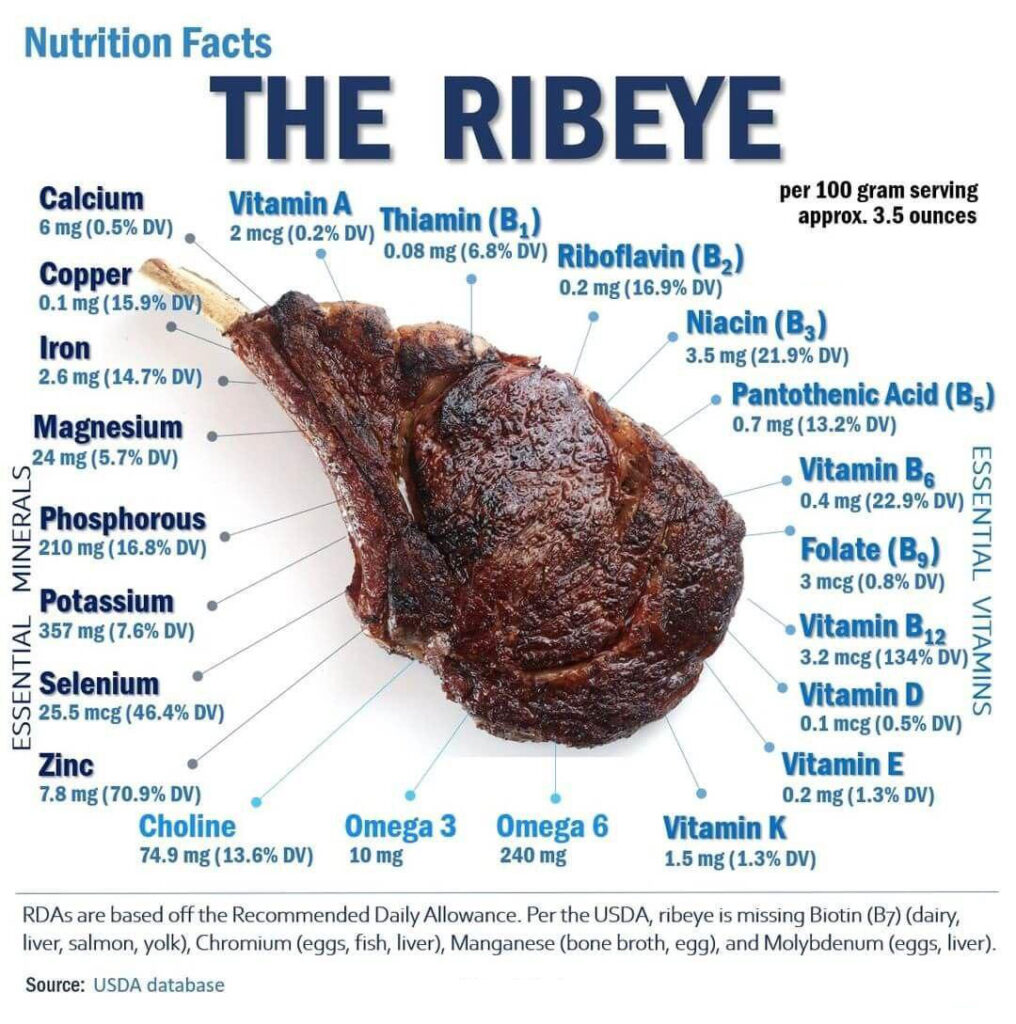
Notice how a ribeye has minerals like iron, selenium, zinc, copper, magnesium… these are the typical ingredients found in supplements for thyroid fatigue.
The only people who need supplements are people who are not eating the foods that contain the minerals and nutrients they lack. We don’t do supplements at Hypothyroidism Success Story because we eat foods that have the nutrients we need to get energy and produce hormones.
Now remember, not all ribeyes are created equal. A rib eye from a cow that’s fed low mineral food (grains, grass, etc.) will not have this nutrient content. A rib eye coming from a cow that is 100% grass fed, grass finished AND eating grass that grows in soil that is mineral rich, will give you these nutrients and more.
The point is that it’s all about the quality of the food, how it’s grown, and last… what can you digest?
Eating the right foods is one thing. Being able to digest the foods you need is a different problem. That’s why what works for some doesn’t work for others if we just talk about foods to eat… That’s why we don’t give out a list of foods here, because first you have to find out what you can digest.
What you can take away however, is knowing that what works for everyone is to eat foods that help you grow probiotics. Why?
… because probiotics are what take food energy and transfer it to the cells of your body. Probiotics are what digest food for you. Probiotics are what make hormones for you. Probiotics are what make you fertile. Probiotics are the answer to just about every issue you struggle with low thyroid. That’s why choosing food that helps you grow probiotics is what is working for us at Hypothyroidism Success Story.
When you have weak probiotics, you are likely to grow bad bacteria like yeast candida, and other stuff that put out toxic waste. Toxic waste from bad bacteria in your gut is what causes your levels to go haywire.
That’s what was happening with Terra who followed our approach and got her levels back to normal.
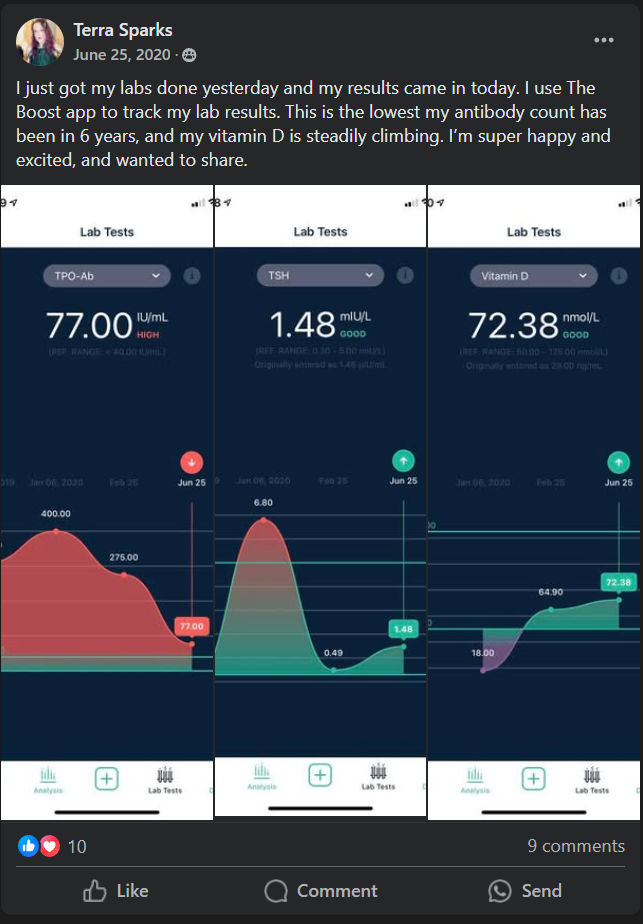
Getting your levels back to normal starts with improving your digestion. Improving your digestion happens by creating an environment for probiotics to grow strong and healthy in your gut. Once you get to that magical point, your hormone production will kick in.
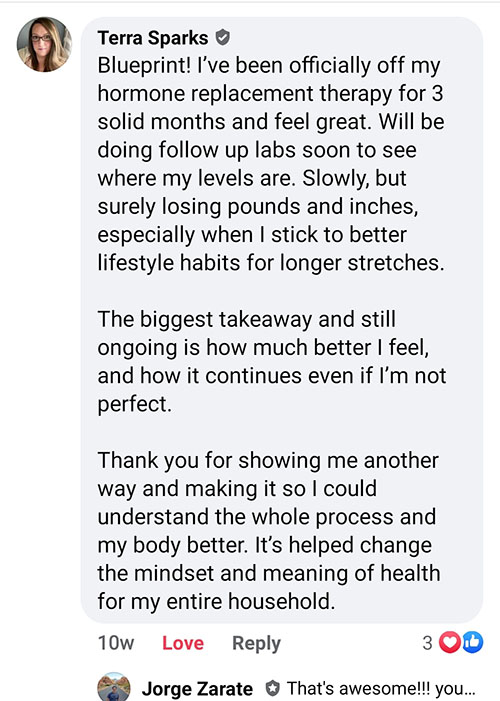
Because of improved hormone production, Terra now gets to enjoy energy levels that allow her to play with her kids and have tons of energy throughout the day. She learned how to choose foods that helped her grow healthy probiotics in her gut.
Forget about learning what foods to eat and focus instead on how to grow probiotics because that’s what will give you energy, help you produce hormones and keep you lean & toned. You can learn more about how to beat thyroid fatigue inside our 5-Day Energy Challenge.
Foods to Boost Underactive Thyroid
Dairy products like eggs, milk, and red meat are some of the best foods you can eat to help your body produce thyroid hormones. The problem people struggle isn’t that they aren’t eating these foods.
The first problem is that they are not getting these foods from farms that follow regenerative farming practices. The second problem is that many people have wrecked their gut and in some cases their liver or gallbladder function which are needed to digest the proteins and fats from these foods.
If you don’t address those digestive issues, then eating these foods will actually lead to inflammation, which is why people are told to cut out dairy and gluten. Cutting out these foods helps, but it doesn’t solve the problem which is poor protein or fat digestion. We can group these two issues into a broken metabolism.
A broken metabolism means that you have weak probiotics or an overgrowth of bad bacteria… or both. When this happens, it doesn’t matter what foods you eat, because the food you eat feeds your gut flora.
If you have bad gut flora, then it doesn’t matter that you eat healthy, clean, organic or whatever because you are feeding bad bacteria in your gut.
Eating unhealthy foods would exacerbate this issue… so what option do you have at this point?
This is where I was when I started and so I started looking at food as a tool to rebuild my gut flora and fix my broken metabolism. This wasn’t easy, but after seven years of trial and error, I finally figured it out.
I had to find highly nourishing foods like grass fed beef liver, bluegreen algae and others to ensure I was getting all the nutrients probiotics need for growth.
… but I also had to learn about herbs to help my body clean and detoxify. I’ve shared many of these in the past, but herbs are definitely not one size fits all. An herb that was good for me, may not be good for you. One of the most common herbs you’ll hear about is ashwagandha, which is quite popular in thyroid supplements. There are better herbs, but before you jump into that realm, I would focus on green juices, which are about the only one size fits all to clean the body.
We walk you through these progressions in more detail when you sign up for the 5-Day Energy Challenge.
How to Get Natural Energy without Restrictive Diets or Supplements
If you are still tired after doing everything that doctors told you to do, maybe even got your labs to “normal”, but you don’t feel normal, then you might be interested in our Energy Blueprint where we walk you through three steps to get your energy back and feel like yourself again without restrictive nutrition plans or supplements…
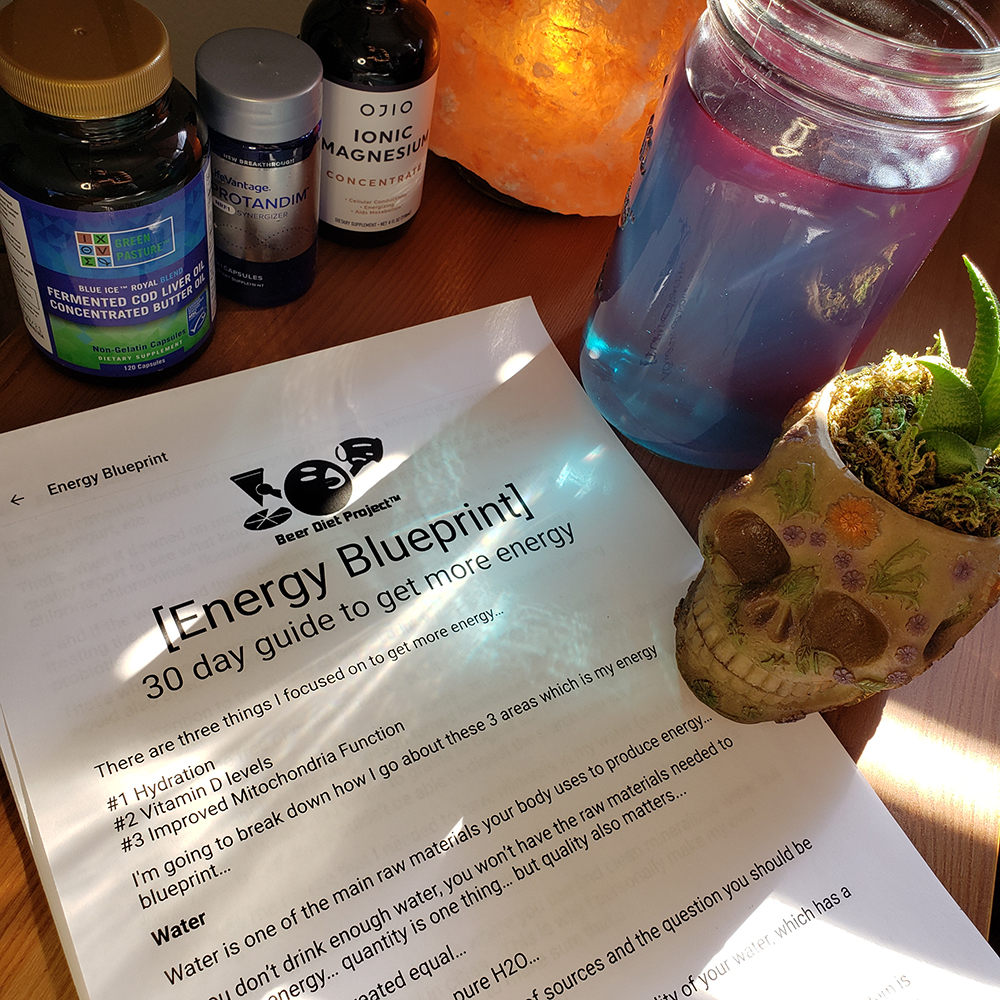
To learn more about our Energy Blueprint we’ve put together a free 5-Day Energy Challenge that gets you:
- Better sleep so you wake up feeling truly rested… your mind will feel clear and focused… no more dragging through the day, just steady energy and sharp thinking from morning to night.
- Reduced inflammation so you watch the puffiness fade… your belly feel flat and light… your clothes fit better, and you feel at home in your body again.
- Better brain function so you feel the fog finally lift. You follow conversations with ease, words come naturally, and your mind feels quick and clear… like you’re fully present again, not struggling to keep up.
- Hair that starts to feel fuller and softer again, and your skin glowing naturally looking smoother, and firmer.
- Feel your strength return… you’ll move around easily, get things done without needing to rest every few minutes, and by the end of the day, you still feel steady and sure on your feet.
- You’ll feel calm and steady… even when things go wrong… You’ll respond with patience instead of snapping, and the little things won’t ruin your whole day anymore.
- Gas and bloating finally eases… you feel light in your belly, your clothes fit comfortably again, and you start to recognize yourself in the mirror…
Listen to Janae share her hypothyroidism success story after following these three steps:
Tap “continue” below to learn these 3 steps in more detail and start your 5-Day Energy Challenge:
